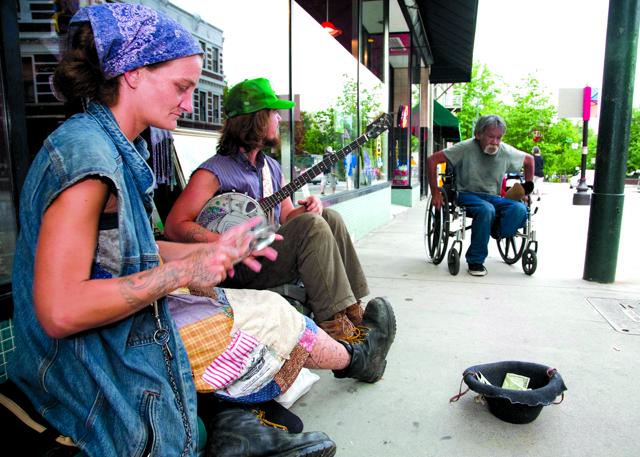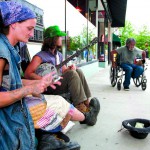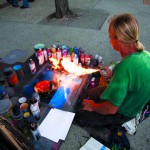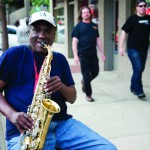- Photos by Chris Wood
Busking. You may not be familiar with the term, but if you’re in downtown Asheville between 9 a.m. and 10 p.m. during the warmer months, you must be familiar with what it denotes. To busk is to perform a creative art — with a guitar, a trumpet or even posing as a statue — on the public stage of the sidewalk.
On a Friday night in Asheville, it’s near impossible to drop a coin without it landing in a hat or guitar case of a busker. Considering Asheville’s tourist economy and do-it-yourself ethos, it’s no surprise that downtown is packed with creative folks working their trade.
Abby, who performs as “The Spoon Lady,” and her partner, “Banjo” Ben Shirley, can be found many days in front of Malaprop’s Bookstore on Haywood Street. This location, with its tall, sheer, windowed facade, is favored by street musicians for its echoing acoustics. The rhythmic clacking of Abby’s spoons accompanies Ben’s old-time-style music. As they perform, crowds of onlookers lean in and listen. Dollar bills accumulate in the hat at their feet, along with other gifts. “People give us all kinds of stuff,” says Abby. “I have a flower here, and a bag of oranges. Someone gave us these smoothies,” she says, holding up a six-pack of to-go yogurt drinks.
It’s clear this gal knows the spoons. “Somebody taught me how to hold ‘em and how to run them down my fingers, and I just kept fiddling with it,” she says. A quick search on the Internet yields several videos of Abby and her repurposed kitchenware, taken in cities across the country. “There’s only four professional spoon players, give or take, in the United States,” she claims. ”People constantly upload videos of me because they haven’t seen the spoons before. They upload me as the ‘Spoon Lady,’ so the name kind of stuck,” she laughs.
For Abby and Ben, Asheville is a temporary home. They met busking in Richmond, Va., a few months ago and came to Asheville to record a CD of traditional music. Camping out of their car by night and playing the street by day, the two plan to move on to another destination later this summer. “I have to be on the West Coast by September,” says Abby, “but we’ll probably be back in this part of the country by Thanksgiving.”
Playing the rules
Many cities in the United States require street performers to register and pay before they can take to the streets, but Asheville discontinued its permit program in 2003. Diane Ruggiero, Superintendent of Cultural Arts, defends the move. “Finding the resources to issue permits is a challenge,” she says. “I think [enabling musicians to play without a permit] is a great service we provide to the community and to musicians.”
This laissez-faire approach makes it easy for musicians like Abby and Ben to roll into town and set up. Critics claim that the streets have become too saturated, and they question the quality of musicianship.
Bobby Sax, who plays the (you guessed it) saxophone and claims to be Asheville’s first street musician, is one of the critics. “I’ve been out here for about nine years,” says Sax. “This is not New Orleans, you know. It’s getting hectic up there on [Pack] Square. I wish they would go back to the license thing, and not let just anybody come out here and play that can’t do it,” says Sax.
But regulating the quality of musicianship, says Ruggiero, would cost money: “Unless we hold auditions, [which would use up resources], there’s no way we could ensure better musicians.”
While Asheville’s street-entertainment laws are relatively lax, there are some regulations on the books. According to a city brochure, musicians are required to stand at least 40 feet away from each other, and leave 6 feet of room around them for pedestrian traffic. The direct sale of merchandise like CDs and tapes is prohibited, although such items can be given away in exchange for a donation. (A PDF of the brochure is available at http://avl.mx/3n).
Other quandaries get worked out among the buskers themselves. Unspoken rules, such as allowing another performer playing time in a choice spot, are typically followed. “The buskers here, in this city, are the most respectful that I’ve seen,” says Whitney, a mandolin player from Maggie Valley. “I’ve only met one group that was really rude, but on the whole everyone’s really respectful of each other.”
Asheville’s street-entertainment law allows busking between 9 a.m. and 10 p.m. In the summer months, this can dampen earnings. “People usually tip better in the evenings,“ says Kevin Jerome, a singer-songwriter who has been busking for almost two years. “As the night goes on, people get more relaxed and they start tipping bigger.”
Like other buskers interviewed for this article, Jerome was hesitant to specify exactly how much he makes. “This is what I do primarily (for money.) This is how I eat,” Jerome says. “The local support is what really keeps it steady. Those locals, on cold days, when nobody’s around, they’ll drop you a ten sometimes.”
Timing is most important when considering a busking location, says Jerome. He relies on his intuition to assess the street’s general feel. “My general rule of thumb is, if the hotels seem pretty packed, then I know it’s a good day to go into town,” he says.
Verse-makers and beggars
American renaissance man Benjamin Franklin busked briefly at the age of 12, performing songs and selling poetry about newsworthy events. He stopped at his father’s insistence, recounting later in his autobiography, “Verse-makers were always beggars; so I escap'd being a poet, most probably a very bad one.”
The general attitude that performing for money is akin to begging is a perception buskers do encounter. While the scene can attract those with a free-wheeling lifestyle, many performers are professionals, on and off the streets.
Daniel Hensley, a drummer who often sets up in the alcove of the Wachovia building on Patton Avenue, performs in local bands including Granpappy and the Bruthaship and Tall Paul and the Teacher’s Pets. Busking, says Hensley, supplements his music gigs and the unemployment checks he receives since he lost his job as an electrician six months ago.
Hensley’s friendly smile, breezy attitude and red ball-cap (“Animal” from the The Muppet Show embroidered on it) are unmistakable. He prefers to play in the cavernous alcove because it amplifies the musicians who sometimes accompany him. “There’s very limited places where I can set up in town. I try to be considerate of other buskers because I’m a lot louder than others,” says Hensley. “But just this past Friday night, the magician got here first. He wasn’t giving it up.”
Sidebar box:
Odd man on the scene
Artist Scott O’Dell makes it clear he is not a street performer, although he attracts large audiences while making his “spray-paintings” of fantastical landscapes, planets and palm trees. He spoke with Xpress about his art form.
O’Dell: “I’m originally from Miami, Fla. I saw somebody in the streets of Florida doing this. I’ve been doing it for over 12 years. I’ve sold over 10,000 paintings. I have my art throughout the whole world. I know last year alone two went to Germany, one went to Australia and one went to England. I’ve been set up here since 2002. I own and operate my own pushcart. I’m not a busker or a street performer.
Xpress: So you have to get a permit from the city and the performers don’t?
[Yes], because I ask for a “denomination” verses a donation. One time I had two paintings out and asked for a donation. A lady gave me 50 cents and took two of my paintings. That ain’t happening.
Do the fumes ever get to you?
Believe it or not, I’m holding my breath a lot. I do have a mask. In Florida [when I paint] I wear my mask, but here in North Carolina, if I put it on, everyone runs for the hills, so I hold my breath more than you would realize.
In the end you use a torch. What is that for?
It actually helps flash-dry the paint. But it’s more for the “wow” factor.
Box:
Did you know? The word busk comes from the Spanish root buscar, meaning “to seek.” Check out Xpress’ field recording project, “Busk Break,” online at facebook.com/buskbreak. Web editor Steve Shanafelt has been capturing the sounds of Asheville’s street musicians for more than a year.
— Ursula Gullow writes about art for Mountain Xpress and her blog, artseenasheville.blogspot.com.







While I agree with Bobby Sax’s sentiment about the proliferation of buskers, I do have to say he is wrong about one thing. He has definitely been busking downtown for more than 9 years. I have a recording of him sitting in with the Derek Trucks Band from 2000 so he’s been around at least 11 years. I remember him playing outside many clubs, concerts, etc during the mid-late 90’s but I don’t have proof of that…only memories. Also, I’m pretty sure he sat in for a song or two during the first time Victor Wooten and his brothers played a show in Asheville at BeHereNow (1997-8ish).
Here’s a link to my recording of that Derek Trucks show:
http://www.archive.org/details/dtb2000-09-21.sbd.flac16